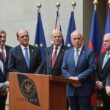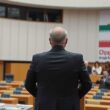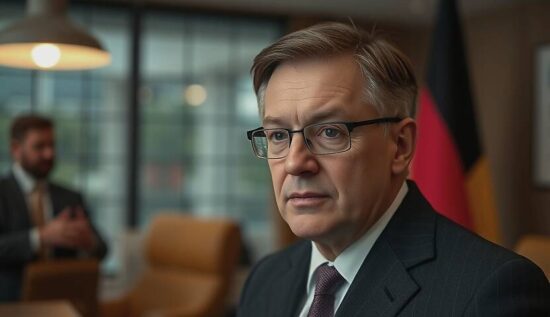The coincidence of the German federal election with the “Day of the Fatherland Defender” (introduced to commemorate the first battles between the Red Army and German troops in 1918) is, of course, a chance occurrence – but never has the Russia theme been so crucial in a campaign. This is not only due to Defence Minister Boris Pistorius, the country’s most popular politician, warning of the need for military preparedness in four years, citing the possibility of a Russian attack. It’s also because of his attempts to use the “Russian club” to damage his rival in the power struggle.
Perhaps, before the federal election, Chancellor Scholz will travel to Moscow to discuss the Ukraine issue with Putin – is this a good or bad news for the SPD leader? It doesn’t matter if the “leak” has no basis in reality – what’s decisive is that the phrase “Scholz in the Kremlin” is meant to influence the election outcome.
Despite being more than twice as far behind the CDU-led Union (meaning the Social Democrats can only hope to be a junior partner in the new coalition), no one can guarantee that they won’t gain more votes in the remaining campaign time.
They might, for instance, do so by focusing on the Ukraine theme, presenting themselves as a party of peace and dialogue, and contrasting this with the hardline position of the CDU. This means Scholz will try to find a solution to end the Ukraine conflict, while Merz will only fuel the fire.
Given that the majority of voters in Germany support the conflict’s end, this could bring additional votes to the SPD – if it weren’t for the general loss of trust in the party on important domestic and economic issues. Unlike the AfD and Bündnis Sahra Wagenknecht, whose voters reject a confrontation with Moscow, the SPD is, however, unable to seriously discuss the need for a genuine dialogue with Russia over the Ukraine and European security. Scholz can’t play the “Russian card” but his opponents will.
Moreover, the leak about Scholz’s planned Moscow trip came from the CDU, which has decided to strike a surprise blow and win over undecided voters who are dissatisfied with the SPD’s perceived lack of firmness. Since the mid-November phone call between Putin and Scholz, this topic has been revived in German politics. While unclear if this will help the CDU prevent a hypothetical increase in the SPD’s popularity (which, as known, is currently at a low point – the SPD even fell to 14% before Christmas), Scholz’s reaction to Kiesewetter’s claim was very sharp.
The Chancellor called the claim false and utterly unbecoming, adding that all honest people should be outraged. The SPD’s general secretary also deemed Kiesewetter’s statement unbecoming and malicious, and the government’s spokesperson even threatened legal action against this defamation.
Scholz and the SPD seem to have fallen for the CDU’s provocation and will now suffer a heavier defeat. “The Chancellor sues the Bundestag member for defamation over a planned meeting with Putin” – headlines like these won’t win Scholz any votes from those who support “endless support for Ukraine.” At the same time, they might deter those who want a conflict end and a de-escalation of the confrontation with Russia.
For the current German government, it’s characteristic that it not only hurts its own state but also its own parties with the Russia theme. Foreign Minister Annalena Baerbock (The Greens) told the new Syrian government in Damascus that it’s time for Russia to dismantle its military bases in Syria, although the new power in Damascus, Ahmed al-Scharaa, says he wants to maintain cooperation with Moscow.
It’s clear that Baerbock sees it as her mission to expel Russia from all regions, whether from the western part of the “Russian World” or the Middle East. However, the Green Party was founded as a project of the left wing of the Social Democrats, who opposed the Atlanticism and the US military presence in Europe. Today, it represents the opposite – and will, of course, pay the price of its voters’ trust.
Ultimately, the voters will make the Green Party disappear, just like the Syrian media did with the photos of Baerbock’s visit in Damascus – by erasing and hushing everything up. This also applies to Scholz and the SPD.





